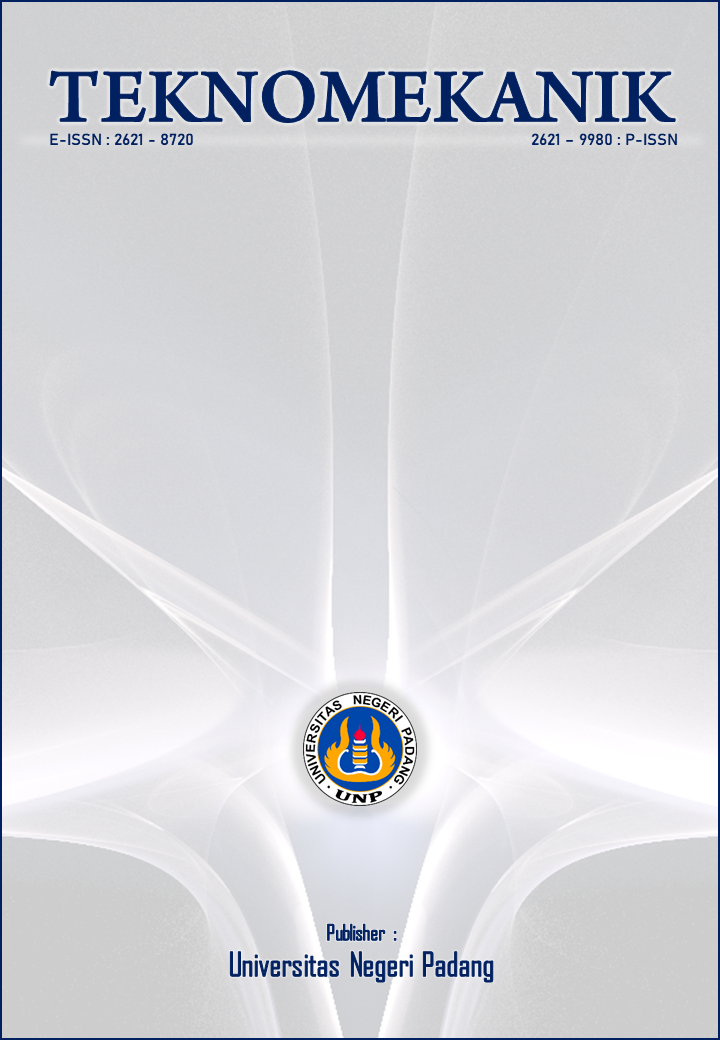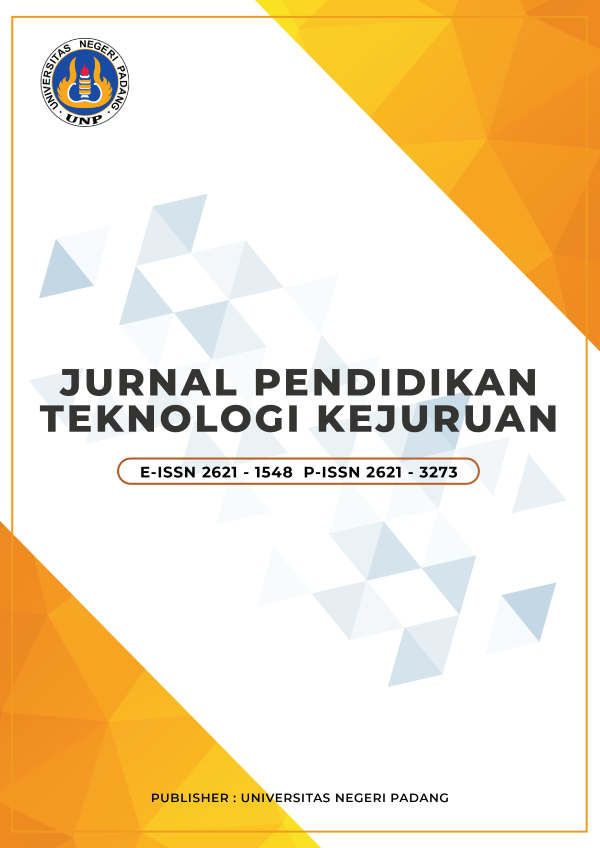Relationship between the completeness of occupational safety facilities and the rate of workplace accidents
DOI:
https://doi.org/10.24036/meej.v1i2.29Keywords:
Completeness, Safety Facilities, Work Accidents, Workshop, Mechanical EngineeringAbstract
Workplace safety and health are crucial aspects that must be implemented in industries and workshops. This aims to ensure that the tasks performed in workshops adhere to established standards and prevent workplace accidents. This research aims to determine whether there is a correlation between the completeness of safety facilities and the rate of workplace accidents and to measure the strength of this correlation. The subjects of this study are 12th-grade students in the Mechanical Engineering Department at SMK Negeri 5 Padang. We employed a cluster random sampling technique to select our sample. Data was collected through observations to assess the completeness of safety facilities, where qualitative data was converted into quantitative data. Additionally, students filled out questionnaires to measure the rate of workplace accidents. The results of the hypothesis testing indicate that the significance value (sig) is 0.00, which is lower than the significance level (sig) of 0.05. Therefore, it can be concluded that there is a significant correlation between the completeness of safety facilities and the rate of workplace accidents. The coefficient test results show that the relationship between the two variables has a strength of 76.4%.
Downloads
References
Acheampong, T., & Kemp, A. G. (2022). Health, safety and environmental (HSE) regulation and outcomes in the offshore oil and gas industry: Performance review of trends in the United Kingdom Continental Shelf. Safety Science, 148, 105634. https://doi.org/10.1016/j.ssci.2021.105634
Bhardwaj, P. (2019). Types of sampling in research. Journal of the Practice of Cardiovascular Sciences, 5(3), 157. https://doi.org/10.4103/jpcs.jpcs_62_19
Bommert, A., Sun, X., Bischl, B., Rahnenführer, J., & Lang, M. (2020). Benchmark for filter methods for feature selection in high-dimensional classification data. Computational Statistics and Data Analysis, 143, 106839. https://doi.org/10.1016/j.csda.2019.106839
Carbone, A., Rayner, G. M., Ye, J., & Durandet, Y. (2020). Connecting curricula content with career context: the value of engineering industry site visits to students, academics and industry. European Journal of Engineering Education, 45(6), 971–984. https://doi.org/10.1080/03043797.2020.1806787
Chatigny, C. (2022). Occupational health and safety in initial vocational training: Reflection on the issues of prescription and integration in teaching and learning activities. Safety Science, 147, 105580. https://doi.org/10.1016/j.ssci.2021.105580
Goh, C. F., & Ong, E. T. (2023). Comparisons of analogical learning and team discussion as interactive in-class activities in flipped classroom of a pharmacy compounding course. Innovations in Education and Teaching International, 60(1), 1–16. https://doi.org/10.1080/14703297.2023.2252391
Hidayat, H., Tasrif, E., Jaya, P., Anwar, M., Thamrin, Zulwisli, Hadi, A., Budayawan, K., Husin, M., & Asmara, D. (2021). The Empirical Analysis of Industrial Work Challenges in the Industrial Revolution 5.0 Towards a Grade Point Average (GPA) for Electronic Engineering Education Students. International Journal of Online and Biomedical Engineering (IJOE), 17(9), 21–34. https://doi.org/10.3991/ijoe.v17i09.25679
Ismara, K. I., Isna, R., & Purnomo, D. (2023). Analysis Of The Safety Dojo Program To Increase Job Competitiveness Of Titl Graduates In Vocational Education. International Journal of Educational Research & Social Science, 4(1), 65–82. https://doi.org/10.51601/ijersc.v4i1.577
Ismara, K. I., Suharjono, A., & Supriadi, D. (2021). Ubiquitous learning in occupational health and safety for vocational education. International Journal of Evaluation and Research in Education, 10(1), 285–292. https://doi.org/10.11591/IJERE.V10I1.20823
Khairat, M. I. S. B., Priyadi, Y., & Adrian, M. (2022). Usability Measurement in User Interface Design Using Heuristic Evaluation Severity Rating (Case Study: Mobile TA Application based on MVVM). IEEE 12th Annual Computing and Communication Workshop and Conference, 974–979. https://doi.org/10.1109/CCWC54503.2022.9720876
Larson, E., Sharma, J., Bohren, M. A., & Tunçalp, Ö. (2019). When the patient is the expert: Measuring patient experience and satisfaction with care. Bulletin of the World Health Organization, 97(8), 563–569. https://doi.org/10.2471/BLT.18.225201
Meilani, D., & Aiman, U. (2021). Implementation of 21st-Century Learning on Psychomotor Learning Outcomes in Science Materials With Learning Motivation as Co-Variable. Proceedings of the 5th Progressive and Fun Education International Conference (PFEIC 2020), 479, 37–40. https://doi.org/10.2991/assehr.k.201015.007
Nassaji, H. (2020). Good qualitative research. Language Teaching Research, 24(4), 427–431. https://doi.org/10.1177/1362168820941288
Oah, S., Na, R., & Moon, K. (2018). The Influence of Safety Climate, Safety Leadership, Workload, and Accident Experiences on Risk Perception: A Study of Korean Manufacturing Workers. Safety and Health at Work, 9(4), 427–433. https://doi.org/10.1016/j.shaw.2018.01.008
O’Toole, M., & Calvard, T. (2020). I’ve Got Your Back: Danger, Volunteering and Solidarity in Lifeboat Crews. Work, Employment and Society, 34(1), 73–90. https://doi.org/10.1177/0950017019862962
Polak-Sopinska, A., Wisniewski, Z., Walaszczyk, A., Maczewska, A., & Sopinski, P. (2019). Impact of industry 4.0 on occupational health and safety. Advances in Intelligent Systems and Computing, 971, 40–52. https://doi.org/10.1007/978-3-030-20494-5_4
Putra Tampi, P., Diana Nabella, S., & Sari, D. P. (2022). The Influence of Information Technology Users, Employee Empowerment, and Work Culture on Employee Performance at the Ministry of Law and Human Rights Regional Office of Riau Islands. Journal of Management, 12(2), 1620–1628. https://doi.org/10.35335/enrichment.v12i3.628
Rauh, S. F., Koller, M., Schäfer, P., Bogdan, C., & Viberg, O. (2021). MR On-SeT: A Mixed Reality Occupational Health and Safety Training for World-Wide Distribution. International Journal of Emerging Technologies in Learning, 16(5), 163–185. https://doi.org/10.3991/ijet.v16i05.19661
Richardo, R., Wijaya, A., Rochmadi, T., Abdullah, A. A., Nurkhamid, Astuti, A. W., & Hidayah, K. N. (2023). Ethnomathematics Augmented Reality: Android-Based Learning Multimedia to Improve Creative Thinking Skills on Geometry. International Journal of Information and Education Technology, 13(4), 731–737. https://doi.org/10.18178/ijiet.2023.13.4.1860
Shafi, M., Liu, J., & Ren, W. (2020). Impact of COVID-19 pandemic on micro, small, and medium-sized Enterprises operating in Pakistan. Research in Globalization, 2, 100018. https://doi.org/10.1016/j.resglo.2020.100018
Shan, D. (2022). Enforcement of fishing Occupational Health and Safety (OHS) standards: Challenges in Atlantic Canada. Marine Policy, 145(September), 105282. https://doi.org/10.1016/j.marpol.2022.105282
Syahril, S., Nabawi, R. A., & Safitri, D. (2021). Students’ Perceptions of the Project Based on the Potential of their Region: A Project-based Learning Implementation. Journal of Technology and Science Education, 11(2), 295–314. https://doi.org/10.3926/JOTSE.1153
Downloads
Published
How to Cite
Issue
Section
License
Copyright (c) 2024 Hanafi Akbar, Mulianti Mulianti, Irzal Irzal, Adri Junil

This work is licensed under a Creative Commons Attribution-ShareAlike 4.0 International License.
Most read articles by the same author(s)
- Rahim Fitra Yodi, Irzal Irzal, Adri Junil, Purwantono Purwantono, Relationship between knowledge and students' welding practical skills , Mechanical Engineering Education Journal: Vol. 1 No. 2 (2023): Regular Issue
- Pres Megari, Mulianti Mulianti, Yufrizal A, Implementation of Project-Based Learning Model in Lathe Machining Technique Subjects to Improve Student Learning Outcomes , Mechanical Engineering Education Journal: Vol. 1 No. 2 (2023): Regular Issue
- Indra Wita, Eko Indrawan, Irzal Irzal, Junil Adri, Primawati Primawati, Student's perceptions on choosing CAD software , Mechanical Engineering Education Journal: Vol. 1 No. 3 (2023): Regular Issue
- Jefri Aditia, Jasman Jasman, Irzal Irzal, Zainal Abadi, Relationship between the Implementation of Occupational Health and Safety and Practical Turning Learning Outcomes of Vocational High School Students , Mechanical Engineering Education Journal: Vol. 1 No. 2 (2023): Regular Issue
- Putra Khairus, Eko Indrawan, Junil Adri, Irzal Irzal, Analysis of job risk at machine workshop , Mechanical Engineering Education Journal: Vol. 1 No. 3 (2023): Regular Issue
- Qhairunnisa Qhairunnisa, Ambiyar Ambiyar, Nelvi Erizon, Mulianti Mulianti, Development of problem-based learning module on fundamentals of mechanical engineeri , Mechanical Engineering Education Journal: Vol. 1 No. 4 (2023): Regular Issue




